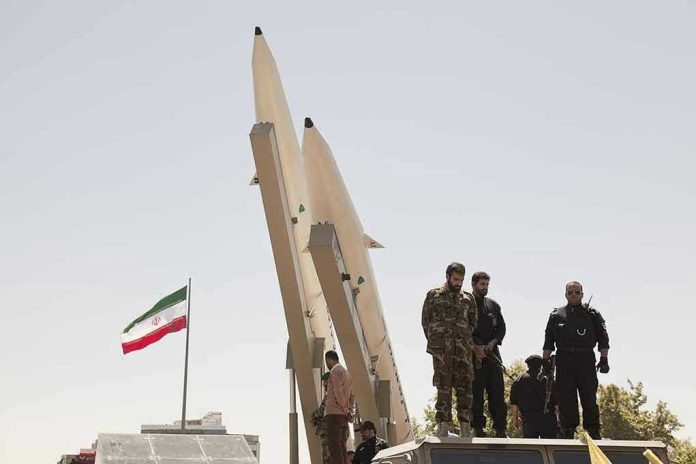🔴 Website 👉 https://u-s-news.com/
Telegram 👉 https://t.me/usnewscom_channel
Iran’s demand that the United States must pay compensation for war damages before even sitting back down at the nuclear negotiating table is not just a new diplomatic curveball—it’s a move that exposes the absurdity of years of weak-kneed foreign policy and puts the credibility of American resolve under the microscope.
At a Glance
- Iran’s foreign minister declares compensation is the price for resuming nuclear talks with the US
- Demand comes after a June 2025 war involving Israeli strikes and US bombing of Iranian nuclear sites
- Tehran’s precondition marks a major escalation in a long, bitter standoff with Washington
- Nuclear negotiations remain frozen, with regional tensions and mistrust at a peak
Iran Turns the Tables: Compensation Before Talks
Iran’s Foreign Minister Abbas Araghchi is demanding that the United States open its wallet before it opens its diplomatic mouth again. In a July 31 interview, Araghchi stated bluntly that the US must compensate Iran for the destruction, deaths, and chaos unleashed during the twelve-day war that erupted in June. Never before has Iran set such an audacious precondition: no cash, no talks. This is a new chapter in the nuclear standoff, and it’s one written in the language of hardball—something Washington, after years of appeasement and the disastrous JCPOA, seems suddenly ill-prepared to answer.
For decades, the US has played the role of the world’s punching bag, absorbing demand after demand from regimes that openly despise our values, our allies, and our interests. Now, with Tehran’s leadership emboldened by a sense of impunity and a litany of American foreign policy blunders, Iran is setting conditions that would have been unthinkable in the past. Araghchi’s words weren’t vague. He insisted, “They need to explain why they attacked us in the middle of negotiations, and they must guarantee they won’t do it again during future talks. And they must compensate [Iran] for the damage they have caused.” That’s not diplomacy; that’s extortion dressed up in diplomatic robes.
How Did We Get Here? The War That Changed the Rules
The timeline that led to this moment reads like a case study in failed deterrence and the consequences of projecting weakness abroad. On June 13, Israel launched a strike against Iran, targeting not just military assets but also nuclear scientists and civilians. The US, for reasons that remain the subject of fierce debate in Washington, joined the fray days later, bombing three Iranian nuclear facilities. Iran’s reply was swift and calculated: missile strikes on Israeli targets and the US air base in Qatar. The dust had barely settled by the time Tehran began constructing its new diplomatic barricade.
It’s not just about the bombs and missiles—though those alone would be enough to sour any negotiation. This is the direct result of a foreign policy vacuum, where America’s enemies take advantage of the endless back-and-forth, the red lines that keep moving, and the obsession with “restoring” deals that never served American interests in the first place. Iran’s hardened stance is a sign that years of half-measures and apologetic diplomacy have made things worse, not better.
No Talks, No Trust, No Progress: The New Normal
The nuclear talks aren’t just stalled—they’re frozen in place by Iran’s new precondition, and Tehran isn’t budging. No details have been provided about the amount or nature of compensation being demanded, which only adds to the farce. Meanwhile, both US and Iranian intermediaries continue to exchange messages, but there is no sign of a breakthrough. In Araghchi’s own words: “The path to negotiations is narrow, but not impossible,” as if the US is expected to crawl through that narrow path on its knees, checkbook in hand.
This is the cost of allowing adversaries to set the terms. Iran’s leadership, especially after direct US military involvement in June, is in no mood to return to “business as usual.” The hardliners have the upper hand, and any move toward talks without a serious show of strength or accountability is seen as weakness. This reality is not lost on those who remember how the last administration’s policies only emboldened Iran’s regional ambitions and nuclear brinkmanship. The longer this farce continues, the higher the risk of another military escalation, with the region—and American interests—hanging in the balance.
The Stakes for America and Its Allies
Iran’s compensation demand is a symptom of a much deeper problem: the collapse of trust in America’s willingness to defend its interests and its allies. The immediate fallout is the total suspension of nuclear negotiations, an outcome that serves only to heighten regional danger. With no talks, the risk of miscalculation and escalation grows by the day. Iranian civilians, already battered by sanctions and war, are caught in the crossfire, while US and Israeli security interests are left to dangle in uncertainty.
Energy markets, always jittery when the Middle East heats up, face renewed volatility. International diplomatic institutions, their credibility already stretched thin, look increasingly irrelevant. If the US caves to this demand, it will set a precedent that every rogue regime will rush to exploit. If Washington stands firm, the standoff could drag on, with all the attendant risks of a wider conflict and nuclear proliferation. Either way, the price of weakness is clear—and the bill is only getting bigger.
Sources:

